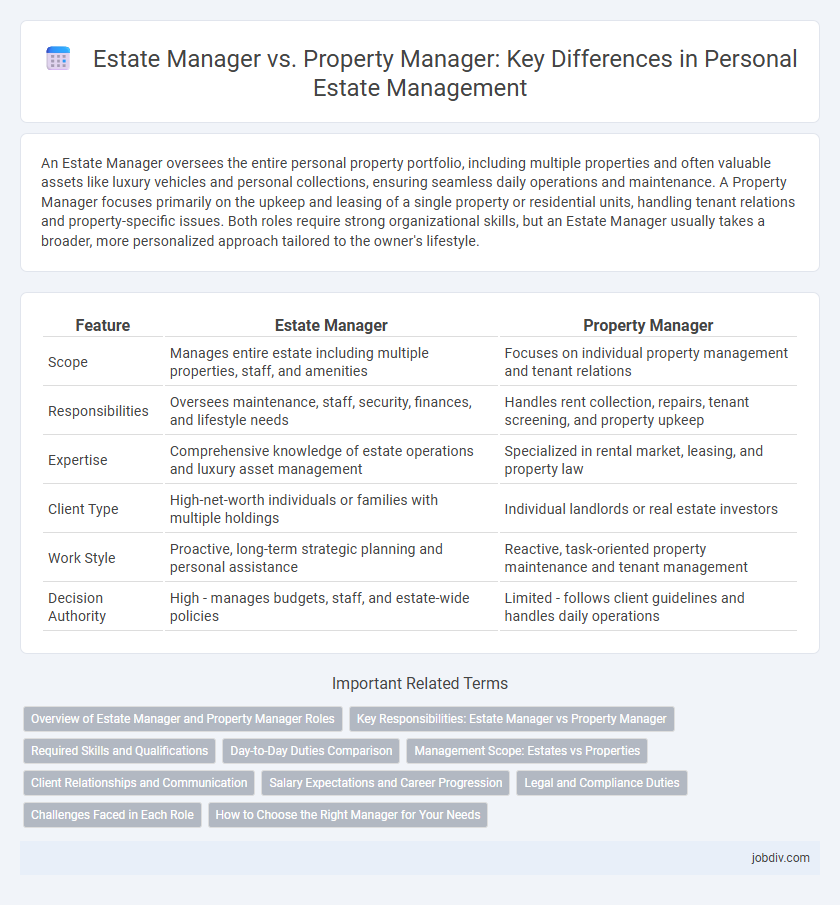An Estate Manager oversees the entire personal property portfolio, including multiple properties and often valuable assets like luxury vehicles and personal collections, ensuring seamless daily operations and maintenance. A Property Manager focuses primarily on the upkeep and leasing of a single property or residential units, handling tenant relations and property-specific issues. Both roles require strong organizational skills, but an Estate Manager usually takes a broader, more personalized approach tailored to the owner's lifestyle.
Table of Comparison
| Feature | Estate Manager | Property Manager |
|---|---|---|
| Scope | Manages entire estate including multiple properties, staff, and amenities | Focuses on individual property management and tenant relations |
| Responsibilities | Oversees maintenance, staff, security, finances, and lifestyle needs | Handles rent collection, repairs, tenant screening, and property upkeep |
| Expertise | Comprehensive knowledge of estate operations and luxury asset management | Specialized in rental market, leasing, and property law |
| Client Type | High-net-worth individuals or families with multiple holdings | Individual landlords or real estate investors |
| Work Style | Proactive, long-term strategic planning and personal assistance | Reactive, task-oriented property maintenance and tenant management |
| Decision Authority | High - manages budgets, staff, and estate-wide policies | Limited - follows client guidelines and handles daily operations |
Overview of Estate Manager and Property Manager Roles
Estate managers oversee the comprehensive administration and maintenance of large residential estates, managing staff, security, and property preservation to ensure seamless daily operations. Property managers focus on managing rental properties, handling tenant relations, leasing, rent collection, and routine maintenance to maximize property value and income. Both roles require strong organizational skills, but estate managers typically handle broader responsibilities across multiple assets within a private estate.
Key Responsibilities: Estate Manager vs Property Manager
Estate Managers oversee the comprehensive operations of large estates, including staff management, maintenance scheduling, and financial administration for multiple properties or expansive grounds. Property Managers focus on tenant relations, rent collection, lease enforcement, and property upkeep, primarily handling residential or commercial rental units. Estate Managers coordinate diverse services such as landscaping, security, and event planning, while Property Managers ensure regulatory compliance and efficient property maintenance.
Required Skills and Qualifications
Estate Managers require strong leadership, financial acumen, and proficient knowledge in property law to oversee large, private estates, often necessitating a background in business management or hospitality. Property Managers emphasize hands-on skills in tenant relations, maintenance coordination, and local real estate regulations, typically needing certifications such as Real Estate License or Certified Property Manager (CPM). Both roles demand excellent organizational skills and experience in vendor management, though Estate Managers prioritize strategic planning while Property Managers focus on day-to-day operational efficiency.
Day-to-Day Duties Comparison
Estate managers oversee large residential properties or multiple estates, handling staff coordination, maintenance scheduling, and security management to ensure seamless operations. Property managers focus on tenant relations, rent collection, lease enforcement, and routine property inspections for residential or commercial buildings. Both roles require addressing repair requests and managing budgets, but estate managers typically engage in more personalized service and comprehensive asset oversight.
Management Scope: Estates vs Properties
An Estate Manager oversees comprehensive estate operations, including multiple properties, staff coordination, financial management, and long-term maintenance planning. A Property Manager focuses primarily on managing individual rental units or commercial properties, handling tenant relations, leasing, and day-to-day property upkeep. Estate management involves broader responsibility across diverse assets, while property management targets specific real estate units within an estate or portfolio.
Client Relationships and Communication
Estate managers maintain long-term, personalized relationships with high-net-worth clients, ensuring tailored communication that aligns with the client's lifestyle and preferences. Property managers typically focus on efficiently managing tenant relationships and addressing maintenance issues, emphasizing transactional communication. Effective communication in estate management involves proactive updates and confidentiality, while property management prioritizes clear, timely responses to tenant inquiries and service requests.
Salary Expectations and Career Progression
Estate Managers typically earn higher salaries than Property Managers due to overseeing larger, multi-property portfolios and providing personalized services for high-net-worth clients. Career progression for Estate Managers often leads to roles such as Chief Estate Manager or luxury asset consultant, whereas Property Managers generally advance to regional or portfolio management positions within commercial or residential real estate companies. Salary expectations for Estate Managers range from $70,000 to $150,000 annually, while Property Managers average between $50,000 and $90,000 depending on location and property type.
Legal and Compliance Duties
Estate managers oversee the legal and compliance duties related to broader estate administration, including land use regulations, zoning laws, and adherence to trust or estate provisions. Property managers focus on ensuring rental properties comply with tenant laws, health and safety codes, and lease agreements. Both roles require detailed knowledge of local, state, and federal regulations, but estate managers typically handle more complex legal frameworks tied to estate planning and asset protection.
Challenges Faced in Each Role
Estate managers often face challenges related to overseeing large, diverse properties and coordinating multiple staff members, requiring exceptional organizational and interpersonal skills. Property managers typically encounter difficulties in tenant relations, maintenance issues, and ensuring regulatory compliance, demanding strong problem-solving abilities and knowledge of local laws. Both roles require adapting to unexpected situations while maintaining property value and client satisfaction.
How to Choose the Right Manager for Your Needs
Selecting the right manager for your estate or property hinges on understanding the distinct roles and expertise each one offers. Estate managers provide comprehensive oversight, handling everything from staff coordination to complex financial management, ideal for large, multifaceted properties. Property managers focus on maintenance, tenant relations, and rent collection, making them suitable for investment properties or rental units requiring hands-on operational management.
Estate Manager vs Property Manager Infographic

 jobdiv.com
jobdiv.com